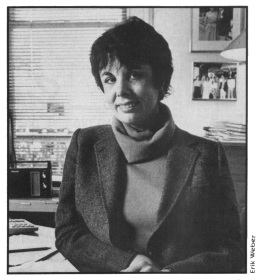education

JOYCE HAKANSSON'S FANTASY FACTORY
Ducks Ahoy software
by GIGI BISSON, Antic Assistant Editor

It looks more like a nursery school than the office of the president of a successful educational software development company.
Joyce Hanansson is surrounded by wind-up toys, posters of mythical horned gods, Kermit the Frog puppets and a stuffed model of the Ducks Ahoy duck. She looks around the room, smiles broadly, and says, "I suppose I never grew up..."
Maybe that childlike quality is the secret to the success of Joyce Hakansson Associates, the developer of best selling educational software such as Ducks Ahoy and the Sesame Street programs for publishers like Spinnaker, CBS Software and Milton Bradley.
"I know kids, I'm able to put myself in their place," she says in a soft, almost childlike voice. She has a quality of enthusiasm and wide-eyed wonder that is rare in the computer industry. When she speaks of possibilities, it's hard to listen without being swept away to a world of flying bananas and dancing bathtubs where computers make it possible for anything to happen.
Hakansson's Berkeley, CA office is within rumor distance of the Silicon Valley, but far away in spirit. It's not part of a low-slung, prefabricated industrial park. Instead it occupies a fanciful, candy-colored, gingerbread-style Victorian house that could have been transplanted from Disneyland's French Quarter. Who knows, that may be intentional – she says Disneyland is enchanted and her favorite place on earth.
This successful business is a long way from Hakansson's first encounter with computers as a housewife in 1973. Her children were having trouble with mathematics in school. So Hakansson approached the principal and asked if she could start a computer math lab.
She recalls that the principal said, "Sure, lady, do what you want. But we don't have any money." Like many school computer labs, it was financed with bake sales. Eventually the school got some timesharing on the computers at the Lawrence Hall of Science.
In 1979 she went to work for the Children's Television Workshop and started their software division. Later she created her own little Disneyland – the Computer Gallery at Sesame Place, a roomful of computers at a Sesame Street theme park in Langhorn, Pennsylvania.
THE JOYCE-TEAM
Hakansson is the antithesis of the programmer who does everything from code to graphics. The Joyce Hakansson Associates are just that – associates. Everyone constantly refers to "the team." Group photos of the team adorn the office walls. It's sort of a socialistic approach to programming. Nobody takes credit, least of all, Joyce.
She insists she doesn't have much to do with the software. She knows how to program, but says she's not a programmer. She can't draw. So what does she do?
"Oh, I have the easy job," she says. "I just sit back here and have fun."
Meanwhile, a talented crew of artists, musicians, educators, programmers and writers buzz around the office. Not surprisingly, most of them are young. Suprisingly, most of them are women.
"Ideas are cheap," Hakansson says. But talented people aren't. She hires people with no experience at all in computers. That's because you can always teach someone about computers, but you can't teach them how to be creative. She says, "I look after them and respect them, and in turn they help me implement an idea that lives in my head."
Above her desk is a bright poster that proclaims: Creativity – the human resource. Here, it's the only resource. Neckties are scorned. Craziness is encouraged. The atmosphere produces things like this goofy joke in the Ducks Ahoy users manual. Who comes out at night, wears black, drinks blood and quacks? Quackula.
Cartoonist Bud Luckey demonstrates a vocabulary game he helped design. Gonzo from Sesame Street is a chickenphile with a rather kinky obsession with eggs. So it's full of bad egg puns, like "eggceptional" and "eggcellent."
Today, they're working on a yet-untitled game for Activision that teaches the principles of electricity. And they are finishing up Passport to Paris and Passport to London, two complex adventure games that teach everything from history to foreign language and customs.
Here's the team approach at work. Ruth Young, the animator, is trying to demonstrate Passport to London, but doesn't know how to play it. So she calls over Bud, the artist. He can't really figure it out either. The programmer is summoned, but he just wrote the code. Nobody can play the game, they surmise, because the writers haven't written the manual yet.
GAMEBUSTERS
Three or four times a week, busloads of kids come in from day care centers and stream into the big victorian house to play with Joyce Hakansson Associates software. They call the kids "Gamebusters."
If a program isn't finished yet, they make a storyboard or picture of it and ask kids what they think. The kids believe they're on a field trip. They have no idea that they're playing a major role – for free – as software consultants. Meanwhile, a full-time employee with a PhD in child development writes a report on how kids relate to the programs.
If there are any public relations people or marketing gurus around, they're nowhere in sight. JHA has the luxury of not needing to worry about publicity or sales – that's all left up to the software publishers like Activision and CBS.
COMPUTER FEAR
If there is a force driving Joyce Hakansson, it's a crusade to conquer computer fear. "That's why I started my business. If kids find computers friendly at an early age, they won't have to go through what I did."
She was terrified of math as a child. "It was something that boys did," she recalls. Later in life, she felt cheated.
"All of us in the Industry are going to have to take care of computer fear. If we want people to be responsive to our products, we're going to have to think seriously about that problem," she says. "Unless that starts to happen, we'll be a lonely few."
Drill and practice programs are boring, she believes. Kids will do them in school only because there's a teacher forcing them to use it.
Things are different at home. Home computer education software has to compete for kids' attention against TV, videogames, the radio and their friends. "So it has to be even more entertaining," she says. And it also has to be easy. "They're not going to spend a lot of time reading manuals."
GENTLE GAMES
But something else sets apart the Hakansson games. In Ducks Ahoy, a game for pre-school children, cute little ducks are picked up in gondolas and paddled around canals in Venice. They have to watch out for hippos – but unlucky ducks don't get gobbled up, shot or eaten. The hippos just dump the boats into the water.
In Passport to London, there is an exciting, James Bond kind of danger element, but there are no guns or weapons.
All of this is intentional. In fact, there are non-violent standards that games must adhere to in order to receive Hakansson's approval.
"When you play any game, even in an arcade, you are learning something. Even if it's no more than eye-hand coordination, even if it's subconscious. When you have a game that rewards violence, you're teaching kids that aggressive behavior is the way to win." As an example of this kind of agression-teaching game, she cites typing tutorials which fire off letters like little missiles.
"Sometimes I wonder – are we teaching math and pattern association, or are we training future missile controllers?" she says. She thinks the most important thing you can teach a child is not how to fight – but how to cooperate.
All this may be the influence of the neighborhood – the office is a stone's throw from the University of California, Berkeley campus where her husband is a professor. The town has a roots of anti-war activism and feminism that began in the '60s. Her stand, however, is not political, but personal.
COMPUTER FEMINISM
As one of the few female executives in the software industry, Hakansson clearly understands the power she has for influencing and changing the role of women in computing.
"First, it's not uncommon for women to fear math," she says. "Secondly, they're generally not machine oriented. If the the garbage disposal breaks down, most women aren't going to tear it apart," she says. "Research has shown that the only machine women usually will tinker with is a sewing machine"
For women, computers are a limited resource. There are one or two computers in a classroom – if you're lucky. "A child has to be aggressive to get to them, and boys tend to be more pushy about it." she says. "Women use the majority of computers in the office. There's a lot of power there, but they don't realize it yet."
"Violent games also dramatically turn off girls from computing, we've found," Haaansson says, with the child-like wonder in her voice being replaced by concern. "It's too close to reality for them."
But with a computer, you can create some of your own reality "It's like theater," she says, as the magic returns to her voice. "The computer is a little world you can enter." This is her Disneyland under glass, a stage where kids can do more than sit in the audience – they interact and become part of the show.
"A child's first access to everything is through play," she says. "The whole idea of educational game software is to demonstrate that computers, reading and learning are all fun."
DUCKS AHOY, SEA HORSE HIDE N' SEEK (ages 3-6) CBS Software One Fawcett Place Greenwich, CT 06836 (203) 622-2614 $12.95 each, 16K cartridge